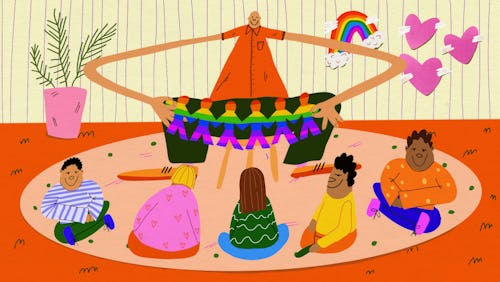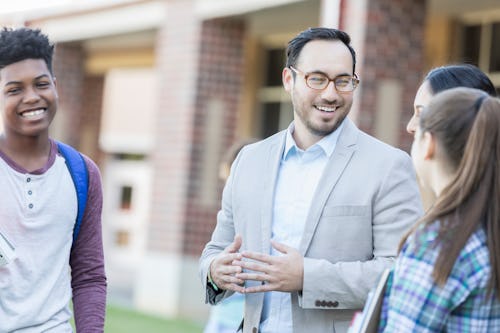
Once upon a time, I was a gay immigrant kid who didn’t know he was gay. At seven years old, my family moved from Mexico to a suburb of Dallas, where I attended elementary school. A lot of that time in my life is now a blur — I struggled to articulate much in English, I wasn’t good at sports and the other boys seemed to sense something was “different” about me (why were only girls interested in playing with me at recess?).
During that tumultuous time of my early schooling, one authority figure sticks out: Mr. Lovell, the music teacher who I knew seemed to know I was queer before I even knew what queerness was. He wrote the school anthem, single-handedly crafted the entire music program, and taught us Austrian operas when we could hardly read. When he stood still, his hand hung limp by his side and there were rumors that he was dating Bill, the scruffy crossing guard from the afternoon shift. No one really lingered on the extraneous details, though, because Mr. Lovell was an indispensable pillar of our school’s community.
After I graduated from elementary school, Mr. Lovell’s mark on my life grew in unexpected ways. He remained the primary reference for the uncomfortable feelings that emerged for me in middle school and beyond. Whenever I had a crush on other boys, I reminded myself that the possibility for romance always existed, because it had for Mr. Lovell, who’d had a fulfilling relationship with Bill. When I saw other guys with limp wrists, I recognized them as being like Mr. Lovell and maybe, perhaps, also, like me? Although I didn’t yet understand the nuances of queerness and how they manifested in our mannerisms, I felt an irresistible pull towards the various Mr. Lovells of the world.
Even after I came out to my friends in college, the thought of Mr. Lovell was never far off and I would tell stories about this “super gay music teacher” I had in 2nd grade, the first visibly queer person I ever knew. Looking back now, I realize why Mr. Lovell had such an indelible impact on my life: He made me feel like people like me existed and mattered. It turns out that early childhood and adolescence are particularly impressionable times — studies have shown that having LGBTQ+ role models has a considerable impact on the mental wellbeing of queer youth.
Thinking about Mr. Lovell made me wonder about other queer kids and whether their queer teachers had left similarly strong marks on their lives. JanCarlos Pinales, a friend who was born and raised in the Bronx but went to boarding school in Connecticut, told me about their gay choir teacher, Michael Bennett. JanCarlos recalls begging the choir director to hire Mr. Bennett after he auditioned for the position because something about him just resonated.

“I looked forward to singing but also just being in his presence. Michael was so naturally confident and it felt so beautiful to witness, because he was so effortless with it,” Pinales tells me. “Through him, I realized sexuality and queerness do not have a set path and everyone's journey is different. So even though I may have not necessarily always related to this white gay middle class man coming from an accepting family, he was the first older role model that made me feel seen and accepted.”
Like me, Pinales didn’t have openly queer adults he knew in his community, which made it hard to envision any future at all. He was raised by parents who had immigrated from the Dominican Republic and didn’t immediately have the tools to recognize Pinales’ queerness. As the son of Chinese and Mexican immigrants, I can totally relate: growing up, there was no language for anything outside of heterosexuality, so it was impossible to even articulate that I didn’t like girls like that. My parents genuinely thought I was just a shy, girly straight boy. For most of our lives, describing what we felt wasn’t a possibility until our queer teacheres— in Pinales’ case, Mr. Bennett — came along. For Pinales, having that role model wasn’t just about comfort. It was also about understanding that queer people had an entire language and culture and that they could become functional, well-adjusted adults.
Paul Bentsen, now a drag queen that goes by Anita Biskit, had a similar experience growing up in Long Island. When he was in 6th grade, his math teacher, Mr. Surval, was an effiminate gay man who was often ridiculed by the kids at school. “At that time, I didn’t necessarily know I was queer but I remember that the F bomb was thrown behind (the teacher’s) back the way it had been at me in elementary school, so I knew we shared something in common,” Bentsen tells me. He says that the knowledge that they shared something in common, even if it wasn’t something that made them popular, made him feel less alone. He also remembers having particularly tender memories of Mr. Surval because he would go out of his way to check on students’ wellbeing.
For many of us, overachieving is a means for survival — a way for our work to compensate for the parts of us that our culture says are ugly.
Bentsen tells me that outside of his teacher, most of the LGBTQ+ representation he saw were in cartoons and TV shows that demonized or tokenized gay people. “I never saw myself as a villain, so in effect I never really saw myself (in these queer characters),” he said. Eventually, Bentsen moved to New York, started doing drag and hopes to serve as a living example of a fulfilled queer adult, in a similar way that his math teacher once did for him.
Through speaking with my LGBTQ+ peers, I was surprised to find that their queer teacher stories felt extremely familiar. What all our teachers had in common, it seems, was that they all went above and beyond their expected roles. Looking back, I recognize those behaviors in Mr. Lovell: Everything he did for the school seemed way out of proportion with his role as an elementary school music teacher. For many of us, overachieving is a means for survival — a way for our work to compensate for the parts of us that our culture says are ugly.
Sometimes, I think of all the obstacles LGBTQ+ teachers must have faced in silence, especially in the early 2000s — being called slurs by students and teachers, parents asking to “tone it down.” But for kids who turned out to be queer, the professors who refused to mute their presence and showed up as their full selves had impacts that are too great to measure. Recently, I had the impulse to look up Mr. Lovell. I’d thought about doing this many times before, but had stopped myself for fear of finding out that something horrible had happened to him. Can queer people even have happy endings? It wasn’t long before I found him on Twitter. According to his bio, he had, indeed, married the crossing guard. It appeared they had retired and were living together in the South of France.







